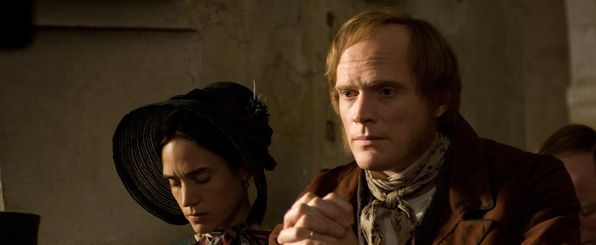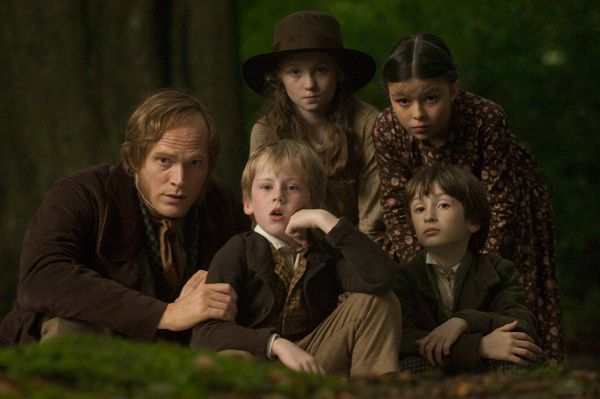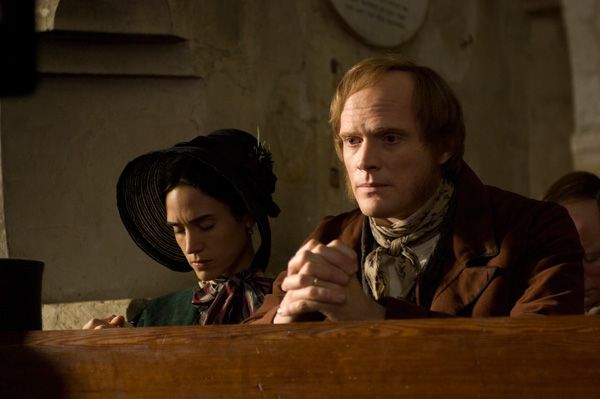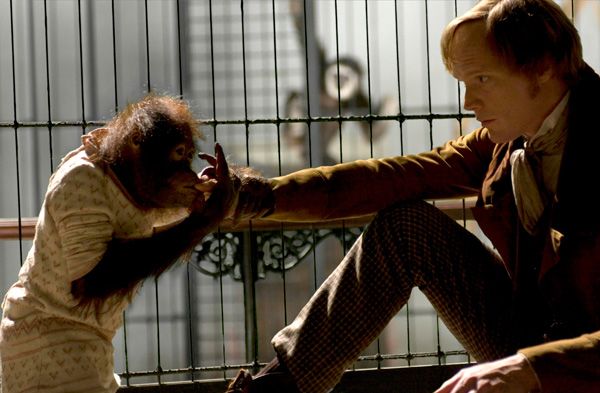Imagine living in a time where you put forth a theory in which, “…the world stopped believing that God had any sort of plan for us? Nothing mattered. Not love, trust, faith – not honor. Only brute survival.” Now imagine that time is 1850s England and you are a scientist – very much living in a world where God is to be feared and has created all things great and small. You come up with a brave, new radical theory on human evolution. Would you risk everything – your professional reputation, standing in society, friends and family to put forward your radical new idea? This is the crux of what Creation wrestles with. It tells the story of Charles Darwin (Paul Bettany) and his tortuous struggle to produce his best known work, “On the Origin of Species.” More after the jump:
The opening quote of this review is Darwin’s reply to his daughter who, upon seeing her frightened and vulnerable father, asks “What are you so afraid of? It’s only a theory.” Yes, only a theory, but quite a theory considering the time and context. The notion stated by Thomas Huxley (Toby Jones) that there is “clear evidence of transformation…over millions of years from a free-swimming prawn to a shellfish stuck on a rock” and that “…evidently what is true of the barnacle is true of all creatures – even humans” is so radical for its time that it cast fear and doubt into the very author that produced it. Indeed, Huxley goes so far as to tell Darwin that “You have killed God.” Joseph Hooker (Benedict Cumberbatch) plays Darwin’s other scientific colleague who, along with Huxley, is primarily interested in pushing Darwin to finish his work. Complicating matters even further for Darwin is his wife Emma (played by Bettany’s real-life wife Jennifer Connelly) who is a deeply religious woman.
The struggle between these two and their beliefs are what often make for the most interesting moments of the film. Paul Bettany’s performance as Darwin is quiet and nuanced, playing one part brilliant scientist and one part deeply devoted family man. Scenes of Darwin the scientist in his study writing about and examining species, are juxtaposed against Darwin the father caring for and playing with his children. In one particularly impressive scene, we see Darwin and his children observe what will come to be known as Darwin’s “natural selection.” In this case, a defenseless baby bird and the consequences of its vulnerability. The way Director Jon Amiel chooses to portray this is quite effective visually.
Creation does a fine job of providing insight into how complex a man Darwin was, while attentively re-creating the time and period in its set design, costumes and cinematography. The talented cast is rounded out by Jeremy Northam who plays Reverend Innes – the local vicar and friend who would ultimately be driven away by Darwin’s obsessive impulses and slavish devotion to his new theory. In addition, it should be noted that of the four children in the cast, Martha West does a more than capable job of portraying nine-year old Annie Darwin – Darwin’s oldest, most beloved and ultimately tragic daughter. Yes, Darwin was the man that penned “On the Origin of the Species” – a theory that would change the world forever, but to claim that he was a cold and removed scientist/intellectual would be a disservice.
He was also a deeply devoted and caring family man who adored his wife and four children and that is ultimately Creation’s main triumph. The film goes out of its way to present us with a more well-rounded and accurate portrayal of this complex and conflicted man. It is interesting to watch Darwin’s struggle between what is expected within societal norms and his own desire as a scientist to challenge and question those norms. Quite simply, Darwin was a polarizing figure for his time.
Special features include a 25 minute featurette entitled, “The Battle for Charles Darwin” where cast and crew are interviewed about what attracted them to the project. Paul Bettany admits he knew nothing of the man but was intrigued by Darwin as one of science’s towering figures and that is ultimately why he took on the role. Screenwriter John Collee relates how it was their intention to show a sentimental portrait of a middle-aged Darwin living with his family who “became a recluse because he was so terrified of the implications of what he knew to be true.” Most interestingly, Randal Keynes the great-great-grandson of Darwin, is interviewed about his book “Annie’s Box” from which source material for the film was used. Keynes goes on to show us the house where Darwin and his wife Emma spent most of their married life and raised four children. Seeing the actual room/study where Darwin wrote such a historically significant document is an added bonus. Finally, this segment wraps up at the European premiere of the movie where cast and crew are interviewed on the red-carpet.
“Debating Darwin” is a seventeen minute segment where top scientists and professors in the biological field debate Darwin and his contributions. The debate between religion and science, along with some deep, tough questions, are asked and pondered. “How did the first biological cell come to be?”, “Why is there such suffering in the world?” and how to explain the human conscious. Deep subject matter for sure, but it’s great to listen to these experts debate and present their theories as they relate to Darwin.
“Digging Deeper into Darwin” is a twenty-six minute segment with Nick Spencer, author of “Darwin and God.” Mr. Spencer discusses in great length and detail the many facets of Darwin and his life. Subjects such as Darwin’s wife Emma, his family and ultimately the delay of “On the Origin of Species” are discussed by this expert.
“Pollard on Film on Creation” offers a five minute segment where writer/presenter Nick Pollard discusses the larger questions posed by the film along with questions on Darwin, the man. For example, in relation to beliefs, Pollard asks “Why do you believe it?” and “What would it take to change your mind?”




